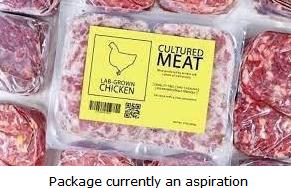
As more start-up and established companies have announced impending commercial production of cell-cultured meat, questions arise as to the commercial viability of the range of products that will be offered. At present, there is no comprehensive approval of cell-cultured meat despite the Food and Drug Administration indicating that it had no objection in principle to products following a review of documentation submitted by one aspirant producer of cell-cultured meat. The U.S. FDA and USDA-FSIS have joint jurisdiction over cell-cultured meat and have yet to issue their regulations.
The market potential for cell-cultured meat may be discerned from the sales trajectory of plant-based meat substitutes introduced during the late 1990s. Following a sharp increase in demand through 2020, consumer interest waned, and market growth has plateaued with every prospect of a decline. JBS closed their Planterra operation and Maple Leaf Foods has reevaluated their considerable investment with an appropriate reduction in projected sales. Beyond Meat (BYND) represents the only pure-play public traded plant-based manufacturer of meat substitutes. This Company has generated a dismal record since their IPO. Beyond Meat has posted increased losses, declining margins and progressively lower sales in both domestic and international markets over the past two years.
 There is general acceptance that the initial growth rate of plant-based products was fueled by a curiosity factor. Given the unjustified premium in price between real meat and substitutes in the form of ground product and sausages, frugal consumers in an inflationary economy have failed to transition to plant-based products or have ceased purchasing based on perceived quality and cost. The demographic willing to pay a premium for subjective attributes such as sustainability welfare and the environment is limited.
There is general acceptance that the initial growth rate of plant-based products was fueled by a curiosity factor. Given the unjustified premium in price between real meat and substitutes in the form of ground product and sausages, frugal consumers in an inflationary economy have failed to transition to plant-based products or have ceased purchasing based on perceived quality and cost. The demographic willing to pay a premium for subjective attributes such as sustainability welfare and the environment is limited.
The plant-based substitute for meat industry has failed to convince consumers that their products are in some way “healthier” than conventional meat. Labels indicate numerous additives and high salt content are of concern to those who obsess over “clean labels”. Although many producers claim equivalent levels of protein, the amino acid profile of plant-based substitutes is inferior to real meat.
It is questioned whether cell-cultured meat will be directed to either the consumer market or to food service. It is one thing to serve a $30 per plate entrée in a gourmet restaurant but an entirely different situation to achieve substitution for real meat on a vast scale by a major multinational QSR chain. It is noted that the major QSRs have all trialed plant-based meat substitutes for limited periods without consumer appreciable acceptance.
Apart from cost, which will have to be equivalent to conventional meat, cell-cultured products will have to incorporate organoleptic qualities including texture, taste and appearance comparable to conventional meat, especially for the more expensive cuts.
To date, the developers of cell-cultured meat have demonstrated technical feasibility in pilot plants and have been lavishly supported by venture capital. The real test will come following erection of capital-intensive production facilities with the inevitable problems of scaling up pilot production to commercial quantities. Even if volumes can be achieved at equivalent cost to conventional meat, which is considered unlikely over the intermediate term, acceptance by both consumers and the food service sector is questionable unless benefits over and above environmental and welfare considerations are evident.